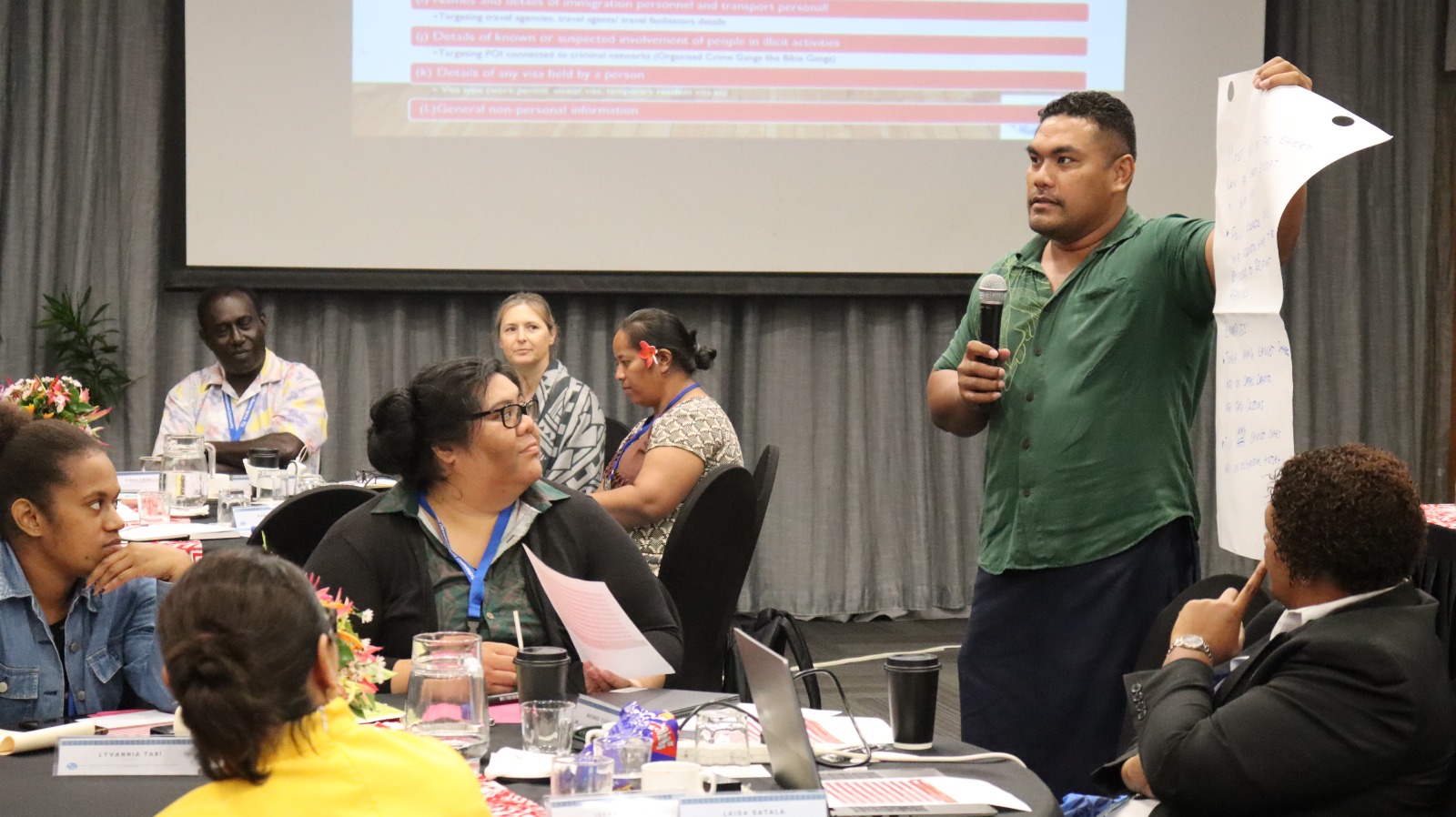The Pacific Immigration Development Community
(PIDC) in collaboration with the United Nations Office on Drugs and Crime (UNODC)
successfully concluded its National Contact Points Profiling Group, and Maritime
Group Information Sharing Regional Workshop on March 22nd, 2024. The 5-day
event aimed to support information sharing practices crucial for managing irregular
migration and securing borders across the Pacific region.
Bringing together senior immigration officers, managers, and directors from seaports
and airports across the region, the workshop provided a platform for sharing
experiences and enhancing efforts in targeted information exchange. Attendees
gained insights into their collective roles as National Contact Points in protecting the
borders of the region, as they learned from the experiences of their counterparts.
The Pacific Transnational Crime Coordination Centre (PTCCC) delivered a workshop
on Cyber security and Maritime Domain Awareness (MDA) platform while also
raising awareness about their role as the ‘hub and spoke’ centre for coordinating and
analysing all information received from Transnational Crime Unities across the Pacific
Transnational Crime Network.
For the first time, PIDC and UNODC Global Maritime Crime Programme also
established in this workshop the Maritime National Contact Group for seaport
Immigration officers to lead the monitoring of people movements in our ocean
through cruise liners, yachting and others.
Throughout the week, participants engaged in discussions on border operations,
national information sharing approaches, and regional threats such as human
trafficking, people smuggling, identity and fraud.
Additionally, members were introduced to digital reporting tools and resources
enabling regional information sharing, which included tools such as the International
Organization for Migration (IOM) Platform.
Ms. Penelope Wilmot a Regional Border Training Officer under the Australian Border
Force based in Fiji, delivered a session on immigration intelligence products and best
practices, drawing from her extensive experiences in countering people smuggling in
Asia. Emphasising the importance of collaboration and information sharing, Ms.
Wilmot highlighted the interconnected nature of Pacific borders, stressing the need
for collective action to address common challenges.
“Drawing from my experience in counter people smuggling in Asia, I'm passionate
about sharing best practices for timely and effective intelligence analysis” she
explained. “Collaboration and information sharing is crucial; otherwise, we're
isolated in our efforts. It’s important for Pacific nations to recognise that our borders
are interconnected. By pooling resources and sharing information, we can address
common challenges collectively. “
“I hope to empower countries to proactively enhance their information and
intelligence gathering processes, particularly concerning the increasing global
movement of people in the Pacific. Through my presentation, I aimed to create a
deeper understanding of high-risk cohorts and emphasise the importance of analysis
and regional collaboration in combating these issues."
This year was the first time the UN Refugee Agency (UNHCR) facilitated a training
session with members. Ms Sarah Mansour delivered a presentation on the
obligations and expectations of signatories and non-signatory states to the UN 1951
Refugee Convention, protecting the rights of refugees and asylum seekers.
The participants reacted with a lot of interests to the presentation especially around
refugees and asylum seekers – which are becoming challenging issues in the region.
As Ms. Mansour anticipated, the session not only generated interests but also raised
awareness of the common responsibilities and obligations of all states regardless of
whether they are signatory of the UN 1951 Refugee Convention.
Reflecting on the workshop, Senior Immigration Officer Ipi Ieli from American Samoa
acknowledged the importance of proactive measures in countering irregular
migration and securing borders.
This past week has been eye-opening, especially regarding border security against
human and drug smuggling and its shown me that we need to be proactive in
countering issues with irregular migration and securing our borders.” Said Ieli. “PIDC
has provided valuable opportunities through this workshop and I have appreciated
the variety in agencies who presented this year, they delivered very insightful
workshops. I realize now that we need further training in interviewing incoming
individuals to better enhance our intelligence quality and understanding the reasons
behind border crossings.
Mr. Akuila Ratu, Head Secretariat of PIDC, expressed his satisfaction at the successful
event and extended his gratitude to the workshop facilitators and members,
The PIDC workshop has provided a valuable platform for fostering collaboration and
enhancing information sharing practices crucial for managing migration challenges in
the Pacific region” he said. “Through engaging discussions and insightful sessions,
participants have gained valuable knowledge and tools to strengthen border security
efforts.” The Secretariat hopes all members have returned to their international
borders with fresh and renewed commitment to collective action and collaboration,
recognizing the interconnected nature of our borders and the importance of
proactive measures in safeguarding our communities.
The PIDC National Contact Points forum was created to foster transparent and
effective communication, nurture genuine partnerships, and strengthen
coordination and collaboration among our Pacific Immigration agencies, to strive for
solidarity and unity on ways to address multifaceted challenges we face in the
immigration spectrum.

